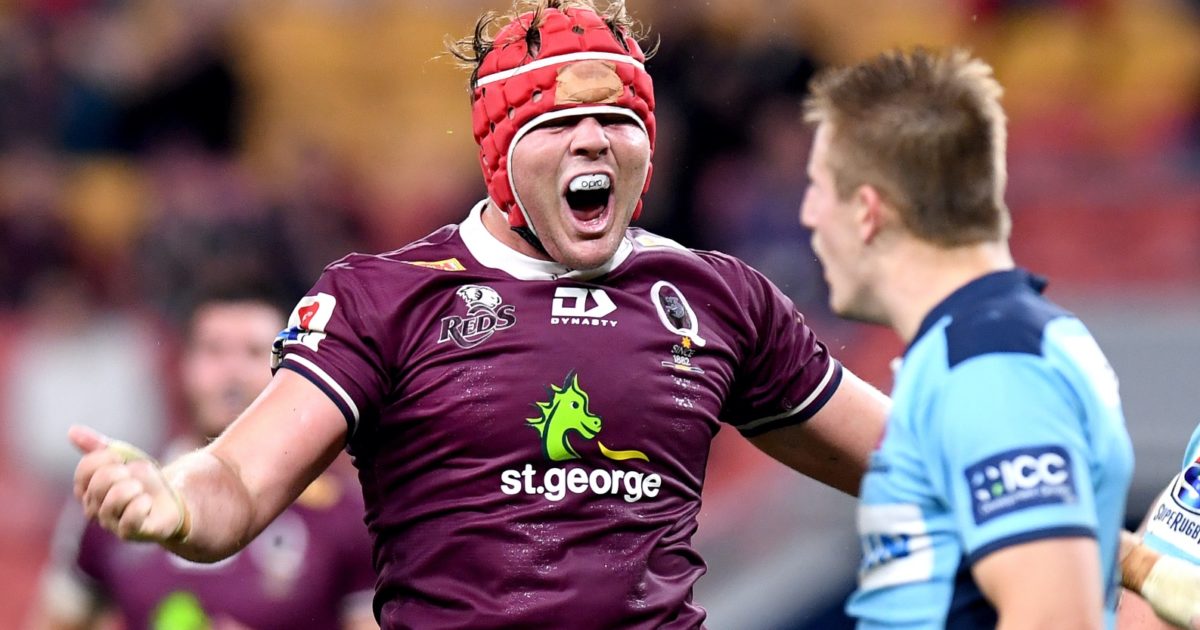Wallabies name three debutants to start in Bledisloe Cup opener against All Blacks

Wallabies head coach Dave Rennie has thrust three of his young stars into the deep end at international level by handing them starting roles against the All Blacks in Wellington this Sunday.
Queensland Reds trio Harry Wilson, Filipo Daugunu and Hunter Paisami have all been named in the first starting XV of the Rennie era following standout Super Rugby AU campaigns for the losing grand finallists.
20-year-old Wilson was arguably the best loose forward in the competition, causing mayhem on either side of the ball at No. 8, but has instead been named at blindside flanker for this match.
He will be joined in making his test debut by Daugunu, the 25-year-old Fijian wing who has qualified for the Wallabies via residency and has shown plenty of attacking promise since making his first-class debut in Australia three years ago.
As for Paisami, the 22-year-old midfielder’s elevation into the Australian national side represents a rapid turn in fortunes after having been dumped by the Melbourne Rebels just 18 months ago.
Given a lifeline by the Reds, the hard-hitting youngster has taken his new opportunity with both hands, performing well enough to warrant a place in the side despite his comparatively lesser-known status.
Starting in the No. 13 jersey, Paisami’s presence in the starting side means highly-regarded one-test Reds utility Jordan Petaia is missing from the squad after having sustained a hip injury in the Super Rugby AU final defeat to the Brumbies.
Paisami will instead be partnered in the midfield with veteran star Matt To’omua, who takes the No. 12 jersey and will form an experienced playmaking axis with starting flyhalf James O’Connor.
By also selecting Nic White as the starting halfback, it seems Rennie has opted for experience over youth in those key positions, with the likes of Brumbies pivot Noah Lolesio denied a starting role despite his good form.
Instead, the uncapped 20-year-old will make his first test appearance off the bench as the only debutant among the reserves.
Last year’s John Eales Medal-winner Marika Koroibete starts on the left wing alongside Brumbies fullback Tom Banks, who is re-called after missing the World Cup to round out the backline.
The #Wallabies are preparing to play against an #AllBlacks side that's steered around the park by Richie Mo'unga. #BledisloeCuphttps://t.co/rasvLGXoQT
— RugbyPass (@RugbyPass) October 8, 2020
Up front, loosehead prop James Slipper continues to narrow in on his 100th test, with Rennie naming him in the No. 1 jersey after an eye-catching campaign with the Brumbies.
The 96-test stalwart will be joined by the blockbusting Taniela Tupou as the team’s props, while try-scoring machine Folau Fainga’a will start at hooker.
There is a new look to the second row as Red lock Lukhan Salakaia-Loto and departing Rebels star Matt Philip will combine in Australian colours for the first time.
Wilson, meanwhile, will be accompanied by Wallabies captain Michael Hooper and destructive Brumbies loose forward Pete Samu in the back row.
Joining Lolesio on the pine are a raft of experienced figures and in-form stars, with utility back Reece Hodge, lock Rob Simmons, Brumbies props Scott Sio and Allan Alaalatoa, and hooker Jordan Uelese all returning from the World Cup squad.
Elsehere, Brumbies loose forward Rob Valetini and Waratahs halfback Jake Gordon will be hopeful of adding to each of their sole test matches.
Wallabies side to face All Blacks:
1. James Slipper, 2. Folau Fainga’a, 3. Taniela Tupou, 4. Lukhan Salakaia-Loto, 5. Matt Philip, 6. Harry Wilson, 7. Michael Hooper, 8. Pete Samu, 9. Nic White, 10. James O’Connor, 11. Marika Koroibete, 12. Matt To’omua, 13. Hunter Paisami, 14. Filipo Daugunu, 15. Tom Banks.
Reserves: 16. Jordan Uelese, 17. Scott Sio, 18. Allan Alaalatoa, 19. Rob Simmons, 20. Rob Valetini, 21. Jake Gordon, 22. Noah Lolesio, 23. Reece Hodge











































